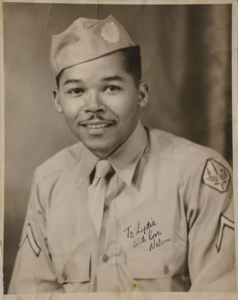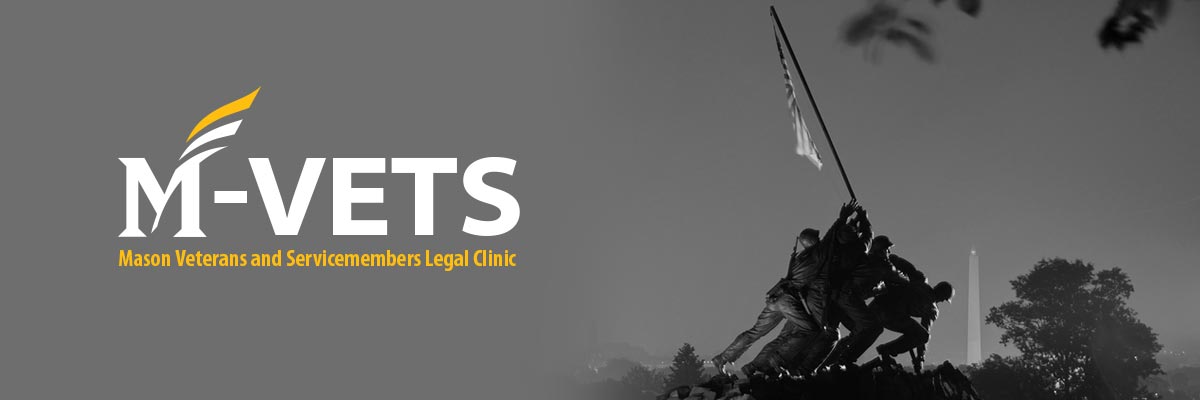
Nelson Henry Jr. in his WWII uniform before his blue discharge in 1945.

Nelson Henry Jr. on April 25, 2019 contemplating his chances of prevailing at the ABCMR.
By Spring 2019 M-VETS Student-Advisor Rachel A. Petrik
Red, white, and blue are three powerfully symbolic colors. After the Continental Congress passed a resolution on July 4, 1776 “authorizing a committee to devise a seal for the United States of America,” the Secretary of the Continental Congress submitted a report declaring that blue shall be the “the color of the Chief” and thereby “signifies vigilance, perseverance & justice.”[1] Yet for more than 48,000 Army soldiers, blue constituted the color of disdain as they were involuntarily discharged from service for being African-American or homosexual. For almost the past 75 years, one of these WWII soldiers, Nelson Henry Jr. (“Henry”), has persevered and is still fighting today to attain the justice he has long deserved in the form of correcting his racially-discriminatory blue discharge to an honorable discharge. The time is now for the Army Board for the Correction for Military Records (“ABCMR”) to take action to automatically restore the honor of veterans like Henry without requiring independent appeals to right a century-old wrong.
Blue ‘Ticket’ Discharges
Only utilized by the Army and Army Air Corps (the predecessor of the Air Force),[2] the “Blue Discharge” originated in 1916 to replace the administrative discharge known as ‘Uncharacterized.’”[3] So defined, a Blue discharge is one “which is neither honorable nor dishonorable.”[4] The bases warranting such a characterization ranged from protracted absence without leave and fraudulent enlistment to poor performance and, the base for Henry’s discharge, “undesirable traits of character.”[5] While the law granted benefits to those whose discharge was “under conditions other than dishonorable,” the Veteran’s Administration at the time (now known as the Department of Veterans’ Affairs) determined that the Blue discharge was “really dishonorable at all,” concluding that such a servicemember “is not entitled to education or other benefits.”[6]
Ultimately, a disproportionate number of Blue discharges were given to homosexual and African-American servicemembers.[7] Regarding the latter, African-American soldiers constituted a mere 6.5 percent of the Army, yet received 22.2 percent of the Blue discharges issued from 1941 to 1945.[8] Consequently, nearly a quarter of African-American soldiers who fought in World War II were separated without benefits simply because of the color of the paper that their discharge was printed on and largely because of the color of their skin.
Eventually, Congress began to acknowledge that these Blue discharges had “much of the practical effect of a dishonorable discharge” simply without the attendant court-martial.[9] Indeed, “[r]epeated complaints ha[d] arisen from all parts of the country in connection” with the implications and ramifications of this discharge.[10] Yet the House of Representatives was acutely aware that the number of complaints hardly denoted the significance of the devastation already felt by too many servicemembers:
For a person to make such a complaint in his own case implies that he feels a sense of injustice so great that he is willing to risk publicizing the stigma of having been discharged from the Army under circumstances which savor of disgrace. For each complainant there are many more persons who feel the same sense of injustice but prefer to bury their hurt in as much oblivion as possible.[11]
Accordingly, Congress explicitly denounced the practice of denying benefits to blue discharge recipients, proclaiming that “[n]othing could more clearly prove the anomalous and illogical and disingenuous nature of the blue discharge than this policy of the Veterans’ Administration.”[12] Recognizing that decisions “on such subjects as ‘habits and traits of character’ are necessarily subjective and often highly questionable,”[13] the legislative body further asserted that “Veterans’ Administration should be estopped from passing moral verdicts on the history of any soldier, and should be required to accept all veterans but those expressly excluded by Congress[.]”[14] To right these wrongs, Congress thus recommended that “procedures be instituted for an automatic review of all blue discharges issued since the beginning of the present emergency, for the purposes of restoring such discharges to the status of honorable discharges [and] in all cases where records admit of any doubt, the soldier [is] to be given the advantage of the doubt.”[15]
Following Congress’s lead, the Army abolished the Blue Discharge in 1947. However, no automatic review procedure emerged from the dust, nor did the Veterans’ Administration reinstate their benefits. Although future freedom fighters were safe-guarded from receiving a colorful discharge that “gives the impression that there is something radically wrong with the man in question, something so mysterious that it cannot be talked about or written down, but must be left to the imagination[,]”[16] those already stigmatized received no remedy.
Veteran Nelson Henry Jr.’s Fight
Enter Nelson Henry, Jr. Having grown up in Bryn Athyn, Pennsylvania, Henry enlisted in the Army in 1942 while he was a pre-dental major at Lincoln University.[17] He began his active duty journey in Missouri in 1943, at which time he was “assigned to segregated units where black soldiers endured racism and horrible conditions, especially in the South in the Jim Crow era.”[18] It was not long until Henry was disciplined for minor, unsubstantiated infractions such as permitting a fire to burn out.[19] After only two short years, his superior officer recommended a Blue discharge.[20] Henry recounts, “I was furious, to tell you the truth. I had no choice.”[21]
Returning to civilian life, Henry started a family with his wife, Lydia.[22] He struggled to find employment with his Blue discharge and lack of educational opportunities without a GI Bill. Yet he never gave up. A taxi driver by day to support his three children and a student by night, Henry graduated with a bachelor’s degree in psychology from Temple University after 13 years of perseverance.[23]
All the while, however, Henry says the Blue discharge “left a bad taste in my mouth, a cloud over my future. This was a blot on my character.”[24] He had tried shortly after his separation in the 1940s to appeal and upgrade his discharge with assistance from the NAACP and American Red Cross, but to no avail. In a markedly succinct letter, Henry was told bluntly that the review board “denied his appeal for an honorable discharge” without further explanation. [25] He thought the door to justice would be forever closed to him and indeed it was for roughly 72 years. Then suddenly the door opened just last year in 2018.
On an unsuspecting day, Henry’s son “saw a segment on NBC about Helen Grace James, a lesbian woman who was kicked out of the Air Force in 1955 because of her sexuality, and whose discharge was upgraded in 2018.” [26] Similar to Henry, she had received an ‘undesirable’ discharge and was separated without any benefits due to a personal trait.[27] She too had continued to fight her stigmatizing discharge until she was 89, finally obtaining a long-overdue correction.[28] If the Air Force was willing to upgrade hers, perhaps the Army would now upgrade Henry’s.
Fortunately, Legal Aid at Work, who handled James’ successful appeal, agreed to represent Henry as well alongside the Golden Gate School of Law Veterans’ Advocacy Clinic, a student-run clinic like M-VETS.[29] The two groups filed in March 2019 with the ABCMR on Henry’s behalf, requesting yet again for “the Army to clear his name and grant him an honorable discharge.”[30] They have also requested for an expedited hearing as Henry is soon to turn 96 this upcoming June.[31] As one of his lawyers highlighted, “The Army doesn’t have much time to do right by him, or by the many other veterans who were wronged by this shameful practice.”[32]
Corrective Actions
How is it that nearly 75 years have passed without remedy for the majority of Blue discharge veterans? Notwithstanding Congress’ unequivocal recommendation in 1946 to establish an automatic review proceeding, no attempt has been made by the ABCMR to do so. Instead, WWII veterans like Helen Grace James and Nelson Henry, Jr. are forced down an unalterable life path of injustice without benefits or support after having served their country. Whether because of their lifestyle or color of their skin, these veterans deserve so much more than to spend the last remaining years of their lives still fighting for what they should have received that fateful day of their separation: A chance to be heard and a chance to be granted an honorable discharge.
Instead, they are relegated to do just that by filing individual appeals that require legal assistance and span several years with no assurance that the efforts will be recognized. Because of the inherent hardships in pursuing a military discharge upgrade from the 1940s, many veterans do not take the leap. Illustratively, a search for “blue discharge” in ABCMR records yields only 16 decisions.[33]
It is estimated that we lose 372 WWII veterans each and every day.[34] It is unacceptable for these veterans to carry the injustices of their era—to no fault of their own—with them to their final resting points at Arlington National Cemetery. They fought for us, our rights, our freedom. Now it is time for us and the ABCMR to fight for them and restore their honor. After all, “[c]aring for our veterans is the duty of a grateful nation.”[35]
*Photos: Jessica Griffin, The Philadelphia Inquirer, https://www.philly.com/news/pennsylvania/nelson-henry-army-blue-discharge-military-discharge-petition-20190503.html.
[1] Duane Streufert, What do the Colors of the Flag Mean?, The Flag of the United States of America (2005), http://www.usflag.org/colors.html.
[2] Upgrading Less Than Fully Honorable Discharges – Introduction, 1 Veterans Benefits Manual 21.1, FN. 6 (2018).
[3] Major John W. Brooker, Beyond “T.B.D.”: Understanding VA’s Evaluation of a Former Servicemember’s Benefit Eligibility Following Involuntary or Punitive Discharge from the Armed Forces, 214 Mil. Rev. 1, 151 (2012).
[4] Blue Discharge, Ballentine’s Law Dictionary (2010).
[5] Bradford Adams et al., With Malice Toward None: Revisiting the Historical and Legal Basis for Excluding Veterans from “Veteran Services,” 122 Penn St. L. Rev. 69, 76 (2017).
[6] Investigations of the National War Effort, H. R. 20, 79th Cong. at 8 (1946).
[7] Melanie Burney, WWII vet wants Army to upgrade discriminatory discharge to ‘honorable,’ nearly 75 years after expelling him, The Philadelphia Inquirer (May 3, 2019), https://www.philly.com/news/pennsylvania/nelson-henry-army-blue-discharge-military-discharge-petition-20190503.html.
[8] Id.
[9] Investigations of the National War Effort, H.R. Rep 1510 at 13 (1946).
[10] Id. at 1.
[11] Id. 13.
[12] Id. at 8.
[13] Id. at 13.
[14] Id. at 9.
[15] Id. at 13.
[16] Id. at 6.
[17] Melanie Burney, WWII vet wants Army to upgrade discriminatory discharge to ‘honorable,’ nearly 75 years after expelling him, The Philadelphia Inquirer (May 3, 2019), https://www.philly.com/news/pennsylvania/nelson-henry-army-blue-discharge-military-discharge-petition-20190503.html.
[18] Id.
[19] Id.
[20] Id.
[21] Id.
[22] Id.
[23] Id.
[24] Id.
[25] War Department Letter to the Honorable William T. Granaham, RE: Appeal of Former Private Nelson Henry Jr. (August 27, 1946).
[26] Melanie Burney, WWII vet wants Army to upgrade discriminatory discharge to ‘honorable,’ nearly 75 years after expelling him, The Philadelphia Inquirer (May 3, 2019), https://www.philly.com/news/pennsylvania/nelson-henry-army-blue-discharge-military-discharge-petition-20190503.html.
[27] Id.
[28] Id.
[29] Elizabeth Kristen, Army Veteran Seeks the Honorable Discharge he was Denied After WWII Because of his Race, Legal Aid at Work (March 12, 2019), https://legalaidatwork.org/releases/at-95-black-army-veteran-seeks-the-honorable-discharge-he-was-denied-after-wwii-because-of-his-race/.
[30] Melanie Burney, WWII vet wants Army to upgrade discriminatory discharge to ‘honorable,’ nearly 75 years after expelling him, The Philadelphia Inquirer (May 3, 2019), https://www.philly.com/news/pennsylvania/nelson-henry-army-blue-discharge-military-discharge-petition-20190503.html..
[31] Id.
[32] Id.
[33] ABCMR Reading Room, “Blue Discharge” (May 2019), https://search.usa.gov/search/docs?utf8=✓&dc=8134&affiliate=boards&query=”blue+discharge”&commit=Search
[34] Frequently Asked Questions, The National WWII Museum, https://www.nationalww2museum.org/about-us/frequently-asked-questions.
[35] Quote by Patty Murray, Quote Fancy, https://quotefancy.com/quote/1338528/Patty-Murray-Caring-for-our-veterans-is-the-duty-of-a-grateful-nation.
